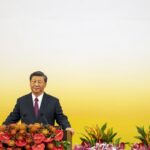
ISLAMABAD (AP) — The Taliban’s supreme leader offered prayers Friday for Afghanistan’s earthquake victims during a speech to Islamic clerics in Kabul.
The tremor in June killed more than 1,000 people in the eastern part of the country. State radio aired Haibatullah Akhundzada’s speech live Friday from the gathering in Kabul, where thousands of Islamic clerics and tribal elders are gathering for the first time since seizing power in Afghanistan in August. Women were not allowed to attend.
Akhundzada’s appearance added symbolic heft to the meeting and the decisions the group is considering about Afghanistan’s future. The Taliban are under international pressure to be more inclusive as they struggle with Afghanistan’s humanitarian crises.
The powerful earthquake killed more than 1,000 people in eastern Afghanistan, igniting yet another crisis for the struggling country and further underscoring the Taliban’s limited capabilities and isolation. Overstretched aid groups already keeping millions of Afghans alive rushed supplies to the quake victims, but most countries responded tepidly to Taliban calls for international help.
Akhundzada has been the spiritual chief of the Islamist movement but has remained a reclusive figure.
He rose from low-profile to leader of the Taliban in a swift transition of power after a 2016 U.S. drone strike killed his predecessor, Mullah Akhtar Mansour.
After being appointed leader, Akhundzada secured the backing of Al-Qaeda chief Ayman al-Zawahiri, who showered the cleric with praise, calling him “the emir of the faithful.”
The endorsement by Osama bin Laden’s heir helped seal his jihadist credentials with the Taliban’s longtime allies.
The Taliban, who have kept a complete lock on decision-making since taking over the country, touted the gathering in the capital of Kabul as a forum to hear a range of voices on issues facing Afghanistan.
But all those who addressed the assembly — and, it appeared, the overwhelming majority of attendees — were Taliban officials and supporters, mostly Islamic clerics.
Women were not allowed to attend, although media reports suggested that the reopening of the girls’ schools would be discussed. The Taliban’s supreme leader earlier this year banned girls after sixth grade from attending school and issued a decree requiring women in public to cover themselves completely, except for their eyes.
The Taliban’s Deputy Prime Minister Abdul Salam Hanafi told state broadcaster RTA on Wednesday that male delegates would represent women. “When their sons are in the gathering it means that they are also involved,” he said.
The gathering was held in the Loya Jirga Hall of Kabul’s Polytechnic University. A Loya Jirga is a gathering of tribal leaders and prominent figures, a traditional Afghan way for local leaders to have their grievances heard by rulers. However, the Taliban notably did not call the gathering a Loya Jirga, instead titling it “the Great Conference of Ulema,” the term in Islam for religious scholars and clerics.
The international cut-off of Afghanistan’s financing has deepened the country’s economic collapse and fueled its humanitarian crises. Millions in the country rely on international aid to have enough food to live.
The meeting comes as finance and central bank officials from the Taliban-led government are meeting with U.S. officials in Qatar to discuss economic and aid issues following last week’s earthquake.
The Washington Post first reported Tuesday that senior Biden administration officials are working with the Taliban leadership on a mechanism to allow Afghanistan’s government to use its central bank reserves to deal with the country’s severe hunger and poverty crises while erecting safeguards to ensure the funds are not misused.




